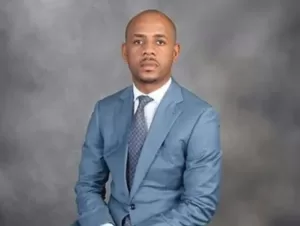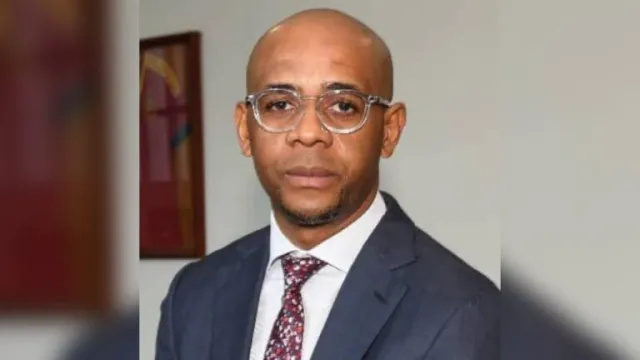Baltasar Engonga, the Director General of the National Financial Investigation Agency (ANIF) in Equatorial Guinea, has been arrested following a scandal that has rocked the country.
The 54-year-old economist is accused of recording over 400 sextapes involving the wives of notable individuals, including high-ranking officials and their families.
The scandal was uncovered during an investigation into alleged fraud by Engonga, which led to a surprise search of his office and residence.
The shocking discovery of the illicit videos, which allegedly feature intimate encounters with a wide range of women, has caused a major uproar in the country.
Among the women recorded in these videos are the wife of Engonga’s brother, his cousin, the sister of the President of Equatorial Guinea, the wife of the Director General of Police, and approximately 20 wives of ministers, according to reports.
These videos were found in Engonga’s personal office and are said to have been recorded with the consent of the women involved, but their subsequent online leakage has sparked outrage.
According to Ahora EG, a local media platform, Engonga, known informally as “Bello,” filmed these sexual encounters with several women, some of whom were married.
The report read, “The most striking thing is that some scenes took place in his work office, including moments in which he is seen sleeping with a woman next to the National Flag. Based on this sexual scandal, the Executive has stated that the measure is a direct response to the acts that have affected the image of the country.
“With these new measures, the Government hopes to establish a clear precedent on the expected conduct of public officials in order to create a more respectful work environment in the public and private administration of Equatorial Guinea.
“For days now, erotic videos have been circulating on social media featuring Baltasar EBANG ENGONGA, better known as “Bello”, who is currently the Director General of the National Financial Investigation Agency (ANIF) and is currently imprisoned for alleged corruption issues.
“Baltasar EBANG ENGONGA is said to have filmed these scenes with the consent of the women themselves, which exonerates him from a possible crime of violation of integrity. In the videos, he is seen having unprotected sex with several women, including those married to powerful and well-known people in the country, but also with the most “diva and influential” single women in Equatorial Guinea. Some scenes take place in hotel rooms, houses, even in the protagonist’s office at the Ministry of Finance,” it added.
The videos, which have been circulating widely on social media, have brought severe embarrassment to both the individuals involved and the broader public.
The government has since announced that these actions have damaged the country’s image internationally.

In response to the scandal, the government has stated that the incident is a direct response to the “acts that have affected the image of the country.
Equatorial Guinea’s Attorney General, Nzang Nguema, also commented on the scandal, explaining that while the women involved were not coerced into participating, the law does not consider consensual sexual relations as a criminal offense unless coercion or violence can be proven.
READ ALSO: Libya Begins Mass Arrest of Nigerians After CAF Verdict
Nguema stressed the importance of victims reporting situations of abuse, adding that it was crucial to maintain a safe and supportive environment for those affected.
“The possibility of a contagious disease being spread through these sexual interactions makes the situation even more critical,” Nguema remarked, indicating that the health implications of the scandal were also a significant concern.
The Attorney General further highlighted the need for victims of sexual abuse or assault to come forward, reinforcing that the law will take action against any forms of misconduct once proven.
The government, as part of its ongoing efforts to curb the consequences of the scandal, has announced an immediate suspension of any officials found to have engaged in sexual relations within the offices of the country’s ministries.
The Vice President of Equatorial Guinea, Nguema Mangue, also commented on the gravity of the issue, pointing out that such behavior is a flagrant violation of both the Code of Conduct and the Public Ethics Law.
In his statement published on *X*, Nguema Mangue emphasized, “ethics and respect are fundamental in our Administration,” reiterating that any actions undermining public trust would not be tolerated.
Government Takes Action
As part of the government’s response to the scandal, Equatorial Guinea has imposed restrictions on its citizens’ ability to download and share multimedia files using mobile data on WhatsApp.
The move was implemented in an effort to curtail the further spread of the sextapes. The country’s telecommunications operators were instructed to take measures to restrict access to inappropriate content, particularly involving the leaked videos.
The decision has sparked frustration among citizens, as many rely on mobile data for communication, work, and educational activities.
A local source quoted by Ahora EG raised concerns, asking, “Should an entire country pay for the actions of a few? The likely decision to restrict access to essential communication functions seems disproportionate and punitive, affecting thousands of users of these platforms who, in addition to serving them for entertainment, also use them for their work and/or educational activities.”
The report added that the restriction, which forces citizens to rely exclusively on WiFi networks to share media, has caused significant disruptions in daily life. Many have questioned the fairness of penalizing an entire population for the actions of one individual.
One concerned citizen remarked, “Is it really fair that everyone should suffer the consequences of the actions of a few? The authorities have not yet provided any explanation for the reasons behind this restriction, as well as the duration of the same. At a time when information and communication are more vital than ever, the lack of transparency only aggravates citizens’ concerns.”
In addition to the media restrictions, the Vice President of Equatorial Guinea, Teddy Nguema, has announced plans to install surveillance cameras in all state offices to monitor the conduct of public servants and prevent any future instances of misconduct. This initiative is part of a broader effort to maintain strict adherence to public service laws and ensure accountability among government officials.

